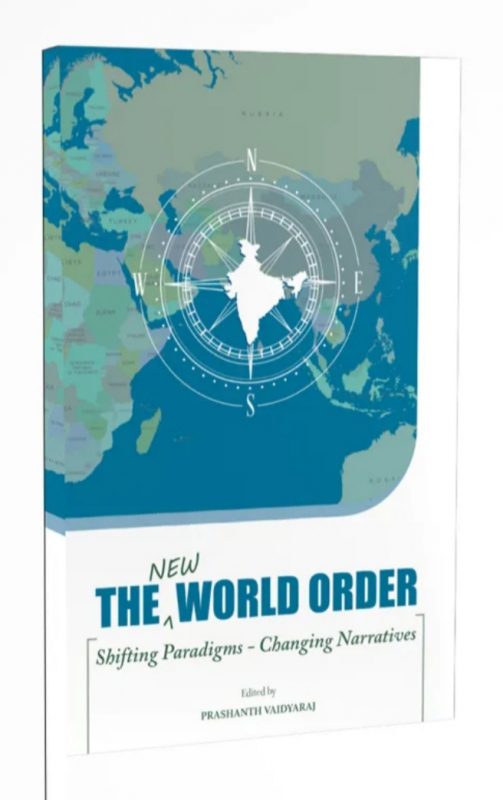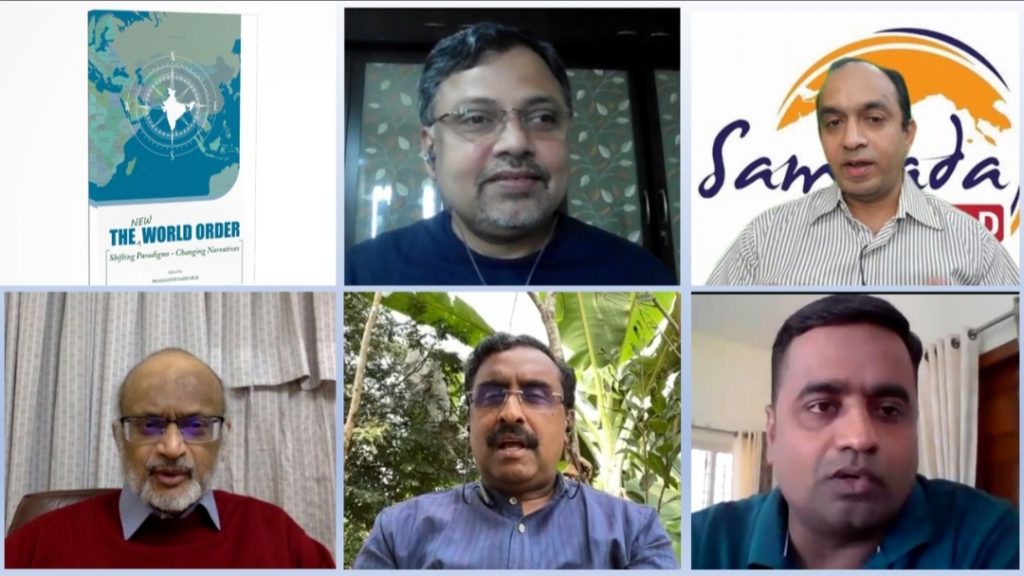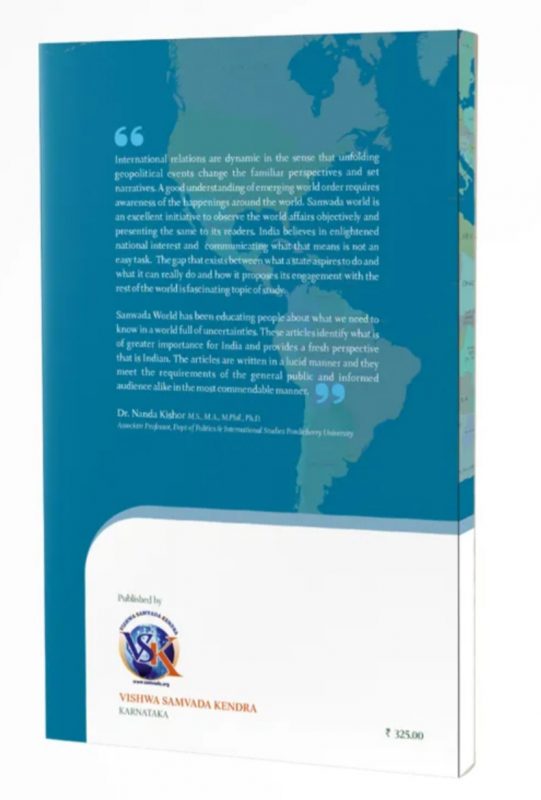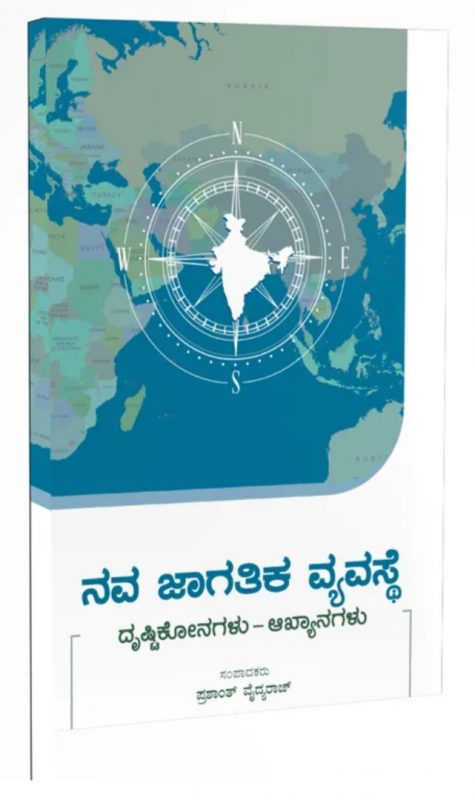
The “New” World Order – Shifting Paradigms – Changing Narratives
9th Jan 2022, Bengaluru:
With the new World Order taking shape at the International Stage, India has a great opportunity to lead the world. How is the new World Order? How is India placed in it? What should India do? Is India ready? What are the priorities? What could be the next steps? What are India’s strengths and challenges in this new World Order?
These are some of the key points discussed and debated – over an interesting and intellectual feast program – at the launch of new Book: The “New” World Order – Shifting Paradigms – Changing Narratives. The event was organised on the day of Pravasi Bharatiya Diwas, the day on 1915, when Mahatma Gandhi returned back to India from South Africa.
The book was launched by an elite panel of Prof. Madhav Das Nalapat (Director – Department of Geopolitics and International Relations @ Manipal Academy of Higher Education), Shri Ram Madhav (Member – National Executive Committee @ RSS and Member – Governing Council – India Foundation) and Dr. Nanda Kishor (Associate Professor – Department of Politics and International Studies @ Pondicherry University).

Scores of people attended the program on-line over Zoom. Selected questions from the audience were also answered as part of the panel discussion.
The program began with Introduction of the panel by Dr. Raghotham Sundararajan, a scholar who studied in MIT – USA. Editor of the book, Shri Prashanth Vaidyaraj, set the platform for the discussion by introducing the book and also read out interesting notes from the pages within.

Prof. Nalapat spoke passionately about the book and said, “This is a fascinating book as an alternative to what we are fed for decade about India’s possible role in the international stage. The book does not claim to be the only view. It gives room for the reader to subscribe to multiple views.”. Prof. Nalapat, commenting on the international situation today, mentioned that USA’s unipolarity is over and that Chinese unipolarity is confronting the world today.
In his quick address to the audience, Prof. Nalapat mentioned: “India had a good opportunity to lead the world stage in 1950s. India missed the opportunities. Today is the new world of new multi-polarities. India has a new opportunity and it should not miss now.”. He found the book will ensure that, India does not miss the opportunity. India to not just stand tall but also to remain stall, in the new world order.
Shri Ram Madhav mentioned that the book is about two topics: the new emerging new World order and that India has a role to play. Shri Ram Madhav mentioned, “The last time the new world order was set around World War II, which was centred around Europe. Internationalism became the new thing soon after. That world order will take a back seat now. With the Pandemic and the after effects, we will have the new world order”. Shri Ram Madhav also listed parameters that will define the new Emerging World Order: Climate change, Health Care issues, Technology – how and why use it and the new paths and trends in International Relationships.

Shri Ram Madhav then touched upon the role India has to play and 2 – 3 handicaps that India has. Indians to reticent people. India does not express their thoughts. India punches below the weight. India had an opportunity post WW-II. India played some role, but did not really make a big impact – that it was capable of. India tried to form an alliance of countries. But this alliance involved countries that were not aligned anywhere. We completely turned inwards. As a second handicap, Shri Ram Madhav said, “we need to have strategic outlook. India did not anticipate the world happenings. For example, India invested in Afghanistan but when Taliban came and overtook Afghanistan, we cried what will happen to our investment now.” As a third handicap, he highlighted lack of economic power. Shri Ram Madhav said, “It has to become economically strong power. India is ranked at 152 – Per capita GDP. We are not in a position to invest heavily in military. Today we need a mix of both soft and hard power.”
Shri Ram Madhav also said: “China is an emerging economy now. Next 10 years are crucial for India. If we overcome our limitations, India can step in and play our role.”
Dr. Nanda Kishor congratulated Shri Prashanth Vaidyaraj for editing the book. He said, “The book carries interesting articles in the form of precise capsules. This helps because the new generation does not have time to read long articles.”. He mentioned that the book has three advantages: It’s relevance in today’s situation, the language used in the book and the precise information it carries. He mentioned that the readers will be able to read and reflect their thoughts over the book.
Talking about India, Dr. Nanda Kishor mentioned that India is no more apologists. It only needs to introspect on where it needs to go, and that this book will help in doing so. Book will bring out the best from the youngsters. This book will go in a long way in inspiring young generation.
During the Question & Answer session, Dr. Raghotham asked questions raised by the intellect audience. The questions were from a wide range of topics, from China and Middle East to the India’s strengths and what it needs to do.
Anwering the question on: “How are we handling China?”, Prof. Nalapat said, “There is no freedom of thought in China. Our strength is in freedom of thought. If we genuinely culture this freedom of thought, it would greatly help. he right to have different view is central to the economy.” Appreciating intellect-quotient of Indians, he said, “Any kind of innovation today in the world has contribution from Indian brains. We need to harness that brain culture.”.
Today’s new World Order is an opportunity for India to play a key role in international stage. And, this is a much bigger than the opportunities in 1950s. Finding a balance in what India has done and that there is much to be done, he said, “We seem to be doing so, also seem to be not-doing-so. We need to understand this and India will emerge one of the top three centres in the next 8 – 9 years.”.
Dr. Raghotham turned to Shri Ram Madhav, asking for views on India’s relationships with USA. He asked, “Our efforts with US, consider US is going to be one of the players. What India should do with US?”.
Shri Ram Madhav categorically mentioned and quoted Prime Minister Vajapayee ji, that “US and India are natural allies. We have lots of things in common. India has to first decide what role it wants to play. The Prime Minister has tried to chalk a new role – by dehyphanation. It is a good step.”. He also expressed that India will not look at itself from the prism other countries. India should have its own independent thinking.
Shri Ram Madhav was confident about ASEAN region to emerge as third largest economic power. He said, we need to give importance to these countries. We are still in the mindset of West World looking approach. The new de-hyphenation is a good approach, but we need march faster on this. India’s priorities should be towards the East than towards West.
Shri Ram Madhav continued with his thoughts on the World Order and the strength in numbers: “The new world order will welcome India when India does not come as a single Country, but comes with a group of countries.”
Answering a question on Europe and Middle East, Nanda Kishore said, “Hostility associated with India, due to Kashmir and other reasons, is now put into different perspectives by these countries. We were having unfounded fears. Regime changes in West Asia is also important. There is now more maturity into the relationships between India and these countries.”
Nanda Kishor said, “India has now moved out of appeasement towards these countries and we are able to put across our thoughts very clearly. India now has good relationship with these Middle East countries.”
Nanda Kishor was of opinion that, Europe is still in the old World Order of pre-1950s. They are still in the old thought that they are leading and that other countries will fall in line. But, things have changed now. India is more confident and has come up with new narratives. India is in a situation now to push for rule based new order.
He said, “With West Asia – we are better off. But, with EU, we need to handle it even better. But we have learnt the grammar now.”
Raghotham: What does India need to change, with respect of mindset, innvoation and economoics.
Answering a question on What does India need to Change? Shri Ram Madhav said, “Many things have to change; First is the mindset. International Relationships should be based on what we want.”
Dr. Nanda Kishore called for balance in India’s approach in International Relationships. He said, “India needs to balance its business relationships at international stage. Today, 45% of India imports are from Russia. We need to balance it well.”
He continued and siad, “Diplomacy with other countries plays a key role, when we want support from countries in International. We should build international relationships irrespective of which countries it is. It does not matter, whether it is a black cat or a white cat, as long as it can catch a mouse.”
Panel also shared that the Think Tank culture has to come in a big way. We should build think tank. Think tank can build an Indian-thought oriented narrative in the international stage.
Prof. Nalapat was categorical in saying, “Let’s remove romance. Politics builds one-sided romantic stories. China took advantage of Cold War 1.0. We should take advantage of Cold War 2.0. We should look at today’s situation from Indian perspective. Look at the good picture. We have a gigantic opportunity at the new World stage now. We need to siege the opportunity. We need to build a mindset to do so. There must be a strong security construct.” He then said that there should be a balance in international relationships.
He called for going with strength to the international table, by building local leadership within the region. He asked, “Did we tell US that, if you do not invite Shri Lanka and other countries, we will not come. When we say such things, we can become a local leader. We should have our priorities. We should send across our people with key positions, like our Chief Ministers to visit Taiwan.”
There was also a discussion on the basis on which international approaches are to be defined. The panel expressed that there is no policy doctrine.
Dr. Raghotham summarized the discussion that, this was a vast topic, interesting discussion, wide range of thoughts expressed, interesting questions were posted. The panel covered information from the historical past to future, made strong observations and gave intellectual insights into the new World Order and the opportunities India has.
Dr. Raghotham highlighted that India should re-fashion itself in the new world order and should take steps in the interest of world to take the new leadership role.
About the Editor: Shri Prashanth Vaidyaraj is from Bengaluru. After working as Software Professional in the IT industry, he turned to Journalism. Over the decade in Journalism, he has played key roles and has carved a name for himself as intellect editor. Prashanth is Editor of Samvada World. He has also authored several articles on International Affairs.
About the book: The book is available in both English and Kannada. Book is edited by Prashant Vaidyaraj and Published by Vishwa Samvada Kendra, Karnataka. Titled in Kannada as: “Nava Jagatika Vyavasthe – DrushtikonagaLu – AakhyanagaLu”. The books can be bought in most of the Book Shops or ordered on-line at: https://www.ayodhyabooks.com/ and at www.hindueshop.com.

Report: Sri Raghavendra Kulkarni




